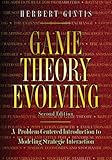Game Theory Evolving : A Problem-Centered Introduction to Modeling Strategic Interaction - Second Edition / Herbert Gintis.
Material type: TextPublisher: Princeton, NJ : Princeton University Press, [2009]Copyright date: ©2009Description: 1 online resource (408 p.) : 79 line illus. 2 tablesContent type:
TextPublisher: Princeton, NJ : Princeton University Press, [2009]Copyright date: ©2009Description: 1 online resource (408 p.) : 79 line illus. 2 tablesContent type: - 9780691140506
- 9781400830077
- 519.3
- HB144.G56 2009
- online - DeGruyter
- Issued also in print.
| Item type | Current library | Call number | URL | Status | Notes | Barcode | |
|---|---|---|---|---|---|---|---|
 eBook
eBook
|
Biblioteca "Angelicum" Pont. Univ. S.Tommaso d'Aquino Nuvola online | online - DeGruyter (Browse shelf(Opens below)) | Online access | Not for loan (Accesso limitato) | Accesso per gli utenti autorizzati / Access for authorized users | (dgr)9781400830077 |
Frontmatter -- Contents -- Preface -- 1. Probability Theory -- 2. Bayesian Decision Theory -- 3. Game Theory: Basic Concepts -- 4. Eliminating Dominated Strategies -- 5. Pure-Strategy Nash Equilibria -- 6. Mixed-Strategy Nash Equilibria -- 7. Principal-Agent Models -- 8. Signaling Games -- 9. Repeated Games -- 10. Evolutionarily Stable Strategies -- 11. Dynamical Systems -- 12. Evolutionary Dynamics -- 13. Markov Economies and Stochastic Dynamical Systems -- 14. Table of Symbols -- 15. Answers -- Sources for Problems -- References -- Index
restricted access online access with authorization star
http://purl.org/coar/access_right/c_16ec
Since its original publication in 2000, Game Theory Evolving has been considered the best textbook on evolutionary game theory. This completely revised and updated second edition of Game Theory Evolving contains new material and shows students how to apply game theory to model human behavior in ways that reflect the special nature of sociality and individuality. The textbook continues its in-depth look at cooperation in teams, agent-based simulations, experimental economics, the evolution and diffusion of preferences, and the connection between biology and economics. Recognizing that students learn by doing, the textbook introduces principles through practice. Herbert Gintis exposes students to the techniques and applications of game theory through a wealth of sophisticated and surprisingly fun-to-solve problems involving human and animal behavior. The second edition includes solutions to the problems presented and information related to agent-based modeling. In addition, the textbook incorporates instruction in using mathematical software to solve complex problems. Game Theory Evolving is perfect for graduate and upper-level undergraduate economics students, and is a terrific introduction for ambitious do-it-yourselfers throughout the behavioral sciences. Revised and updated edition relevant for courses across disciplines Perfect for graduate and upper-level undergraduate economics courses Solutions to problems presented throughout Incorporates instruction in using computational software for complex problem solving Includes in-depth discussions of agent-based modeling
Issued also in print.
Mode of access: Internet via World Wide Web.
In English.
Description based on online resource; title from PDF title page (publisher's Web site, viewed 30. Aug 2021)


